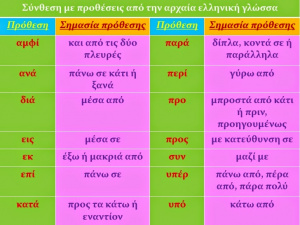Difference between revisions of "Language/Ancient-greek-to-1453/Grammar/Prepositions"
m (Quick edit) |
|||
| (3 intermediate revisions by one other user not shown) | |||
| Line 1: | Line 1: | ||
[[File:-2-728.jpg|thumb | [[File:-2-728.jpg|thumb]] | ||
Prepositions are concise words that typically come before nouns, and sometimes before verbs as well. They are considered "predefined" because they have a fixed meaning and are used to indicate the relationship between the noun or verb they precede and other words in the sentence, such as declined nouns, pronouns, or adverbs. When used in this way, prepositions are traditionally known as "prepositional phrases." | |||
In addition to their function in sentences, prepositions can be divided into two categories: proper and improper. Proper prepositions have their own meaning, while improper prepositions are formed by combining a preposition with another word. | |||
There are 18 prepositions in total, with six being monosyllables and 12 having two syllables. Overall, prepositions play a crucial role in constructing sentences that convey clear meaning and facilitate effective communication. | |||
<span link>Take a moment to explore these relevant pages as you conclude this lesson:</span> [[Language/Ancient-greek-to-1453/Grammar/Verb-λύω:-active-voice|Verb λύω: active voice]] & [[Language/Ancient-greek-to-1453/Grammar/The-verb-:-εἰμί|The verb : εἰμί]]. | |||
== Monosyllabic Prepositions == | == Monosyllabic Prepositions == | ||
{| class="wikitable" | {| class="wikitable" | ||
| Line 17: | Line 23: | ||
|- | |- | ||
| σύν || with | | σύν || with | ||
|} | |} | ||
| Line 50: | Line 54: | ||
| ὑπέρ || above, over, beyond because of, by reason of | | ὑπέρ || above, over, beyond because of, by reason of | ||
|} | |} | ||
{{Marianthi-Signature}} | {{Marianthi-Signature}} | ||
== | ==Other Lessons== | ||
* [[Language/Ancient-greek-to-1453/Grammar/Future-Tense|Future Tense]] | * [[Language/Ancient-greek-to-1453/Grammar/Future-Tense|Future Tense]] | ||
* [[Language/Ancient-greek-to-1453/Grammar/Accents-in-Ancient-Greek|Accents in Ancient Greek]] | * [[Language/Ancient-greek-to-1453/Grammar/Accents-in-Ancient-Greek|Accents in Ancient Greek]] | ||
| Line 65: | Line 68: | ||
* [[Language/Ancient-greek-to-1453/Grammar/The-verb-have-(ἔχω)|The verb have (ἔχω)]] | * [[Language/Ancient-greek-to-1453/Grammar/The-verb-have-(ἔχω)|The verb have (ἔχω)]] | ||
* [[Language/Ancient-greek-to-1453/Grammar/Tenses|Tenses]] | * [[Language/Ancient-greek-to-1453/Grammar/Tenses|Tenses]] | ||
<span links></span> | |||
Latest revision as of 10:34, 27 March 2023
Prepositions are concise words that typically come before nouns, and sometimes before verbs as well. They are considered "predefined" because they have a fixed meaning and are used to indicate the relationship between the noun or verb they precede and other words in the sentence, such as declined nouns, pronouns, or adverbs. When used in this way, prepositions are traditionally known as "prepositional phrases."
In addition to their function in sentences, prepositions can be divided into two categories: proper and improper. Proper prepositions have their own meaning, while improper prepositions are formed by combining a preposition with another word.
There are 18 prepositions in total, with six being monosyllables and 12 having two syllables. Overall, prepositions play a crucial role in constructing sentences that convey clear meaning and facilitate effective communication.
Take a moment to explore these relevant pages as you conclude this lesson: Verb λύω: active voice & The verb : εἰμί.
Monosyllabic Prepositions[edit | edit source]
| Greek | English |
|---|---|
| ἐν | in, among, during |
| εἰς-ἐς | in, into, within |
| ἐκ-ἐξ (ἐκ becomes ἐξ before a vowel) | from, out of, forth from |
| πρό | in front, before, preferably at |
| πρός | by, in addition to |
| σύν | with |
Two-Syllable Prepositions[edit | edit source]
| Greek | English |
|---|---|
| ἀνά | upon, up, through |
| διά | through, by means of, because |
| κατά | down, along, according to |
| μετά | after, behind |
| παρά | with, near |
| ἀμφί | about, around |
| ἀντί | opposite, instead of, for the sake of |
| ἐπί | on, for the purpose of, because of |
| περί | about, near, around |
| ἀπό | from, =distance: starting point, origin |
| ὑπό | under |
| ὑπέρ | above, over, beyond because of, by reason of |
Author[edit source]
- Ευγενική χορηγία που στοχεύει να βοηθήσει μαθητές ή μη, απανταχού της Γης, που επιδίδονται στην εκμάθηση της ελληνικής γλώσσας!
- Contribution bénévole visant à aider les personnes, partout dans le monde, qui sont engagées dans l'apprentissage de la langue grecque !
- Voluntary contribution aimed at helping people, all over the world, who are committed to learning the Greek language!
Other Lessons[edit | edit source]
- Future Tense
- Accents in Ancient Greek
- Aspect in the Ancient Greek Verb
- The degrees of adjectives in Ancient Greek
- Ancient Greek Adverbs
- Verb λύω: active voice
- Ancient Greek Adjectivess
- Article, verb or relative pronoun?
- The verb have (ἔχω)
- Tenses
